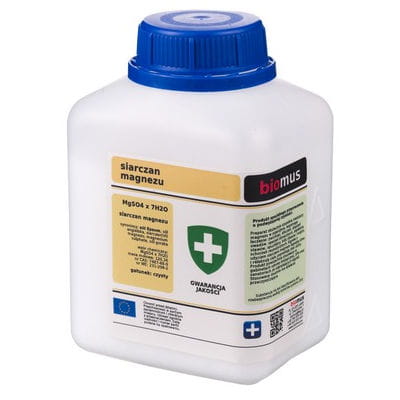Magnesium sulfate Epsom salt 500g BIOMUS
- Regular price
- €3,89
- Regular price
-
- Sale price
- €3,89
- Unit price
- per
Couldn't load pickup availability
Description
x Pure magnesium sulphate min. 99.5%
Chemical formula: MgSo4 x 7H2O
Magnesium sulfate is an inorganic chemical compound - the salt of sulfuric acid and magnesium. It is also known as Epsom salt (Epsom salt, English salt, Epsonian salt, Epsomite, Epsom salt) - the name comes from the town of Epsom in central England, where this compound was obtained by evaporating mineral water. The substance is similar to common table salt (sodium chloride), but tastes bitter (hence the name Epsom salt), is odorless, and has a neutral pH for the skin.
APPLICATION
relaxation bath
Add 1-2 glasses of magnesium sulfate to hot water. Magnesium is a natural antiperspirant, it has a calming effect and compensates for the lack of this element in the body. The sulfur in Epsom salts soothes skin lesions.
Softening Salt
For a wash, use about 1/3 cup magnesium sulfate; You can add a few drops of fragrance or aroma in the form of an oil,
skin lesion preparation
dissolve two tablespoons in a glass of water and apply to the skin,
Preparing for mosquito bites - dissolve two tablespoons of Epsom salts in a glass of water, dampen a gauze pad and apply the compress to the bite areas,
cleanser
Perfect for cleaning sinks, tiles in the kitchen and bathroom, joints, etc. PREPARATION Mix equal proportions of magnesium sulphate and washing-up liquid to form a paste.
Magnesium sulfate in the garden:
as a fertilizer -effective for spraying leaves with magnesium,
as an insect repellent - for spraying garden and balcony plants,
as a plant nutrient - fertilizes the soil; perfect for conifers and lawns and as a fertilizer for garden and potted flowers and vegetables.
Use a solution of 1 tablespoon Epsom salts in 2 liters of water. It prevents lawns and coniferous trees from turning brown,
as a snail repellent - sprinkle salt in the area prone or at risk of snails.
RECOMMENDED STORAGE CONDITIONS
Store dry, dark and cool. use as intended. Keep out of reach of children.
similar products
- Regular price
- €3,89
- Regular price
-
- Sale price
- €3,89
- Unit price
- per
- Regular price
- €3,89
- Regular price
-
- Sale price
- €3,89
- Unit price
- per
- Regular price
- €3,89
- Regular price
-
- Sale price
- €3,89
- Unit price
- per
- Regular price
- €3,89
- Regular price
-
- Sale price
- €3,89
- Unit price
- per
- Regular price
- €3,89
- Regular price
-
- Sale price
- €3,89
- Unit price
- per
- Regular price
- €3,89
- Regular price
-
- Sale price
- €3,89
- Unit price
- per
- Regular price
- €3,89
- Regular price
-
- Sale price
- €3,89
- Unit price
- per
- Regular price
- €3,89
- Regular price
-
- Sale price
- €3,89
- Unit price
- per
- Regular price
- €3,89
- Regular price
-
- Sale price
- €3,89
- Unit price
- per
- Regular price
- €3,89
- Regular price
-
- Sale price
- €3,89
- Unit price
- per
Recently Viewed Products
- Regular price
- €3,89
- Regular price
-
- Sale price
- €3,89
- Unit price
- per
- Regular price
- €3,89
- Regular price
-
- Sale price
- €3,89
- Unit price
- per
- Regular price
- €3,89
- Regular price
-
- Sale price
- €3,89
- Unit price
- per
- Regular price
- €3,89
- Regular price
-
- Sale price
- €3,89
- Unit price
- per
- Regular price
- €3,89
- Regular price
-
- Sale price
- €3,89
- Unit price
- per
- Regular price
- €3,89
- Regular price
-
- Sale price
- €3,89
- Unit price
- per
- Regular price
- €3,89
- Regular price
-
- Sale price
- €3,89
- Unit price
- per
- Regular price
- €3,89
- Regular price
-
- Sale price
- €3,89
- Unit price
- per
- Regular price
- €3,89
- Regular price
-
- Sale price
- €3,89
- Unit price
- per
- Regular price
- €3,89
- Regular price
-
- Sale price
- €3,89
- Unit price
- per
- Choosing a selection results in a full page refresh.











